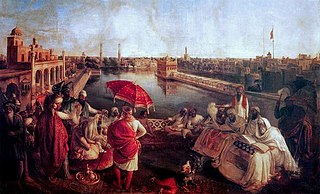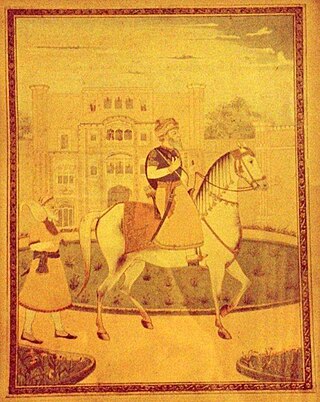Places
- Qila Tara Singh, a town and union council of Depalpur Tehsil in the Okara District of Punjab Province, Pakistan
Tara Singh may refer to:

Sikhs are an ethnoreligious group who adhere to Sikhi or Sikhism, a Dharmic religion that originated in the late 15th century in the Punjab region of the Indian subcontinent, based on the revelation of Guru Nanak. The term Sikh has its origin in the Sanskrit word śiṣya (शिष्य), meaning 'disciple' or 'student'.

The Punjabi Suba movement was a long-drawn political agitation, launched by Punjabi speaking people demanding the creation of autonomous Punjabi Suba, or Punjabi-speaking state, in the post-independence Indian state of East Punjab. The movement is defined as the forerunner of Khalistan movement.

The Shiromani Gurdwara Parbandhak Committee is an organization in India responsible for the management of Gurdwaras, Sikh places of worship in states of Punjab and Himachal Pradesh and the union territory of Chandigarh. SGPC also administers Darbar Sahib in Amritsar.

Baldev Singh was an Indian Sikh political leader, he was an Indian independence movement leader and the first Defence Minister of India. Moreover, he represented the Punjabi Sikh community in the processes of negotiations that resulted in the independence of India, as well as the Partition of India in 1947.

Tara Singh was a Sikh political and religious figure in India in the first half of the 20th century. He was instrumental in organising the Shiromani Gurdwara Prabhandak Committee and guiding the Sikhs during the partition of India, which he strongly opposed.

The Ramgarhia are a community of Sikhs from the Punjab region of northwestern India, encompassing members of the Lohar and Tarkhan (carpenters) subgroups.

The Tarkhan is a caste found in the Punjab regions of India and Pakistan. They are traditionally carpenters by occupation.
Guru Nanak founded the Sikh faith in the Punjab region of the northern part of the Indian subcontinent in the end of fifteenth century. He was first of the ten Sikh Gurus. The tenth, Guru Gobind Singh, formalised its practices on 13 April 1699. He baptised five Sikh people from different parts of India, with different social backgrounds, to form Khalsa fauj. Those five Beloved Ones, the Pañj Piārē, then baptised him into the Khalsa fold. This gives the order of Khalsa a history of around 500 years. Historical theory and analysis suggests that Sikhism came into existence during the early Medieval period of the Bhakti movement and also after repeated invasions by Muslim rulers upon the Hindu community during Mughal rule, which lasted between especially in the region of North India.

Gadar: Ek Prem Katha is a 2001 Indian Hindi-language romantic period action drama film directed by Anil Sharma from a story written by Shaktiman Talwar and was set during the Partition of India in 1947. Loosely based on the life of Boota Singh, the film stars Sunny Deol and Ameesha Patel in lead roles alongside Amrish Puri and Lillete Dubey. Sharma's son Utkarsh as a child artist plays Deol and Patel's son before his first film as an leading man titled Genius (2018). Patel bagged Sakeena's role out of 500 girls who auditioned for the role.

Jassa Singh Ramgarhia (1723–1803) was a prominent Sikh leader during the period of the Sikh Confederacy. He was the founder of the Ramgarhia Misl.

Sultan-ul-Qaum Sardar Jassa Singh Ahluwalia was a Sikh leader during the period of the Sikh Confederacy, being the Supreme Leader of the Dal Khalsa. He was also Misldar of the Ahluwalia Misl. This period was an interlude, lasting roughly from the time of the death of Banda Bahadur in 1716 to the founding of the Sikh Empire in 1801. He founded the Kapurthala State in 1772.

Baghel Singh was a Military general in the Punjab region in the northern part of the Indian subcontinent in the 18th century. He rose to prominence in the area around Sutlej and Yamuna. Singh joined the Singh Krora Misl, one of the misls during Sikh Confederacy. In 1765, Singh became the leader of the misl.
Kalsi is a famous Tribe of Tarkhan Sikhs also known as Ramgarhia Sikhs.

Ramgarhia Bunga or Burj is the three-storeyed red stone watchtowers complex located near southeastern edge of the Golden Temple, Amritsar. The two minaret-style Ramgarhia Bunga high towers are visible from the parikrama (circumambulation) walkway around the Harmandir Sahib Sarovar. It is a pre-Ranjit Singh structure built by Sikh warrior and Ramgarhia misl chief Jassa Singh Ramgarhia in late 18th-century, after the 1762 destruction and desecration of the Sikh holy temple and site by the Afghan Muslim forces led by Ahmed Shah Abdali. The Bunga watchtowers-related infrastructure was constructed to station sentinels to watch for any surprise attack, house soldiers to help fortify the area, and to protect the holy complex from desecration.

Tara Singh Ramgarhia was a prominent Sikh leader, a Sardar, brother of the famous Jassa Singh Ramgarhia (1723–1803).

Gulab Kaur was an Indian freedom fighter. She was born around 1890 and died in 1941.

The Shiromani Akali Dal (SAD) is a centre-right Sikh-centric state political party in Punjab, India. The party is the second-oldest in India, after Congress, being founded in 1920. Although there are many parties with the description Akali Dal, the party that is recognized as "Shiromani Akali Dal" by the Election Commission of India is the one led by Sukhbir Singh Badal. The party has a moderate Punjabi agenda. On 26 September 2020, they left the NDA over the farm bills.

Parkash Singh Badal was an Indian politician who served as the 8th Chief Minister of Punjab from 1970 to 1971, from 1977 to 1980, from 1997 to 2002, and from 2007 to 2017. He was also Leader of the Opposition in the Punjab Legislative Assembly from 1972 to 1977, 1980 to 1983 and from 2002 to 2007 and the 11th Union Minister of Agriculture and Farmers' Welfare in the Morarji Desai ministry from 1977 to 1977. He was the patron of Shiromani Akali Dal (SAD), a Sikh-centered regional political party, and the president of the party from 1995 to 2008, when he was replaced by his son Sukhbir Singh Badal. As the patron of SAD he exercised a strong influence on the Shiromani Gurdwara Parbandhak Committee and Delhi Sikh Gurdwara Management Committee. The Government of India awarded him the second-highest civilian award, the Padma Vibhushan, in 2015.

Ramgarhia Misl was a sovereign state (misl) in the Sikh Confederacy of Punjab region in present-day India and Pakistan. The misl's name is derived from Qila Ramgarh, a place located in Ramsar, near Amritsar, which was fortified and redesigned by Ramgarhia Misl chief Jassa Singh Ramgarhia. The Ramgarhia Misl was one of the twelve major Sikh misls, and held land near Amritsar.